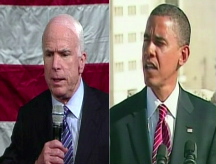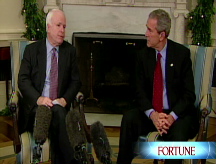Stocks: A presidential chicken and egg
Are the markets selling off because investors fear more taxes if Obama wins, or is the weak economy why Obama has a lead in the polls in the first place?
NEW YORK (CNNMoney.com) -- There's only a week to go until a winner (hopefully) is crowned in the presidential race. But are investors taking a close look at the polls and starting to price in a victory by Barack Obama?
The general rule of thumb on Wall Street is that a Democrat in the White House, particularly if coupled with Democratic control of Congress, is bad for the markets because it tends to mean higher taxes and policies less favorable to big corporations. And stocks certainly have been volatile lately.
Still, several market experts said it would be silly to suggest that investors are worrying about on Obama win.
Sure, there may be some individual stocks and sectors that would fare better based on who wins the election. I took a look at some potential Obama and McCain buys and sells in a column last week.
But there are a lot of other things going on that are having a much bigger impact on the overall market, like, hmmm, I don't know, the unraveling of the credit markets perhaps?
"There has been such a tsunami of events that have happened domestically and abroad. The credit crisis is swamping anything that's going on right now with the two candidates," said Rafael Resendes, manager of the Toreador Large Cap fund.
In fact, some suggest that the weak markets are helping Obama build a lead in the polls, and are not a reflection of Wall Street's concern about him defeating John McCain.
Simply put, with a Republican currently in the Oval Office, that is making it tougher for McCain to convince voters that the economy and markets would improve under him - even though that may not be completely fair since the Democrats have majorities in both the House and Senate.
"The market is not pricing in an Obama presidency. There's probably going to be an Obama presidency because the economy is weak," said Barry Ritholtz, director of research for Fusion IQ. "People have it backwards. A bad economy equals low earnings and that's good for the challenger."
The numbers back this argument up.
Ed Clissold, senior global analyst with Ned Davis Research, has analyzed how the markets have done in election years dating back to 1900.
He found that when stocks perform poorly in the months leading up to the election, that's usually bad news for the member of the party currently in charge, no matter which one it is.
"Voters do view the party in the White House as those who are to blame or get credit for economic performance," he said. "If voters are using the election as a referendum on the economy and stock market, the incumbent should suffer."
Still, others said that there could be other political concerns at work. It's starting to look not only as if Obama may win but that Democrats also have a chance of securing 60 seats in the Senate - a filibuster-proof majority.
"It's not just the presidential election but what's happening in Congress. More or less, investors are pricing in a Democratic Congress and president," said John Derrick, director of research with U.S. Global Investors Inc. in San Antonio.
"If you have a one-sided government, there is bigger potential for more extreme outcomes in Washington. That's part of what's going on here," he added.
And data from Ned Davis Research back up the notion that one party controlling both the executive and legislative branch may not be great news for the markets.
According to Clissold, stocks have done better with a Democrat in the White House and Republican-controlled Congress than when Democrats control both branches. Likewise, stocks have performed better with a Republican president and Democratic majority in Congress than when there is a member of the GOP as president and Republicans in control of Congress.
It makes sense. Even though a power split in Washington often leads to gridlock, it's also worth noting that the last two major periods of economic prosperity came about thanks to a certain degree of bipartisan cooperation.
"Ronald Reagan with a Democratic Congress and Bill Clinton with a Republican Congress were some of the best market years we've ever seen," Ritholtz said."If you have a divided government, but people are reasonable and try to work with each other, you can have more centrist policies and balanced compromise."
Nonetheless, the possibility of higher taxes under Obama, especially higher capital gains taxes, could still be playing a small role in what's going on in the markets lately.
"Normally, discussions about raising capital gains tax rates should have a serious impact on the markets. If you raise them, you change the price of investing," Resendes said.
Of course, Resendes was also quick to point out that capital gains taxes may not be an issue for many in the short-term given the market's massive losses this year and uncertainty about how stocks will fare in 2009.
When all is said and done, the markets might greet the end of the election campaign positively no matter who wins. It may also help that markets historically perform well in the last two months of the year. Investors may be looking for an excuse to buy after what's been a brutal September and October.
So as long as the presidential race doesn't get dragged out in the courts ala 2000, investors may simply breathe a sigh of relief because the election will be one less thing to have to worry about.
"October is the jinx month, so people might be looking to invest ahead of the best period for stocks, which is usually November through April," said Gerry Sparrow, manager of the Sparrow Growth fund.
"Irrespective of who wins, stocks might go up after the election. A lot of uncertainty will be removed from the market," he said. ![]()




